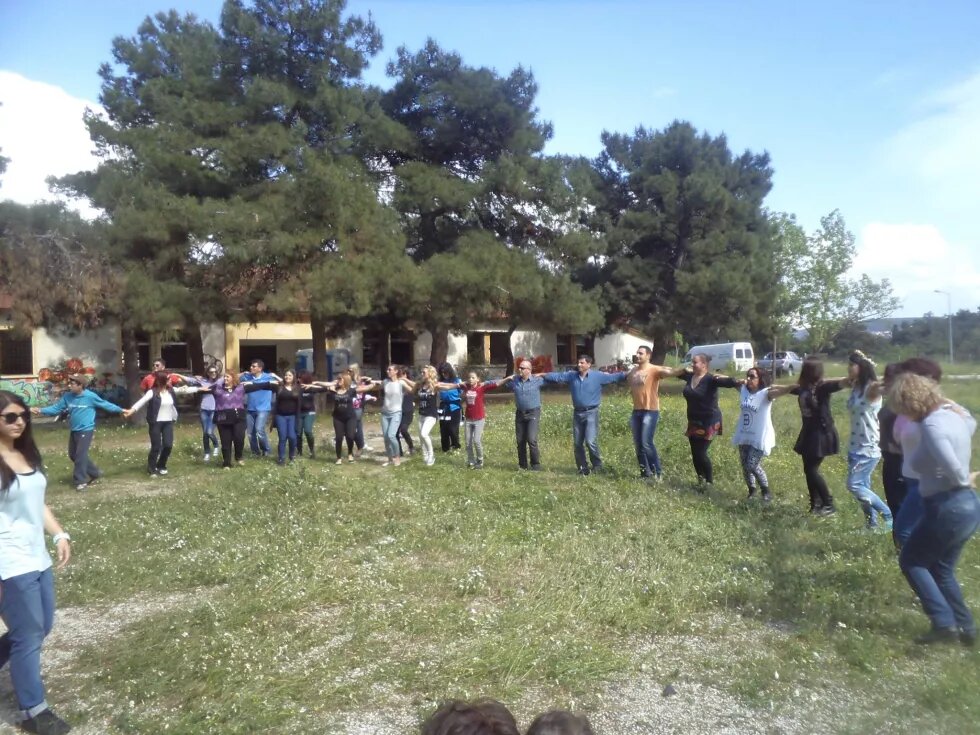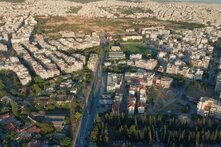
The Neighborhood Planning Committee is an institution for citizens’ participation in decisions concerning their living space. It has existed for 40 years but never really functioned. Recently, it was activated again on the occasion of the citizens’ struggle to return the former “Karatasios” camp to them. Journalist Kostis Kekeliadis discusses the issue with PhD candidate of the Aristotle University of Thessaloniki Sokratis Seitanidis and local resident Irini Stavridou.

In what ways can we turn knowledge into power, imagination into reality, and theory into action? There are no recipes or definite answers; the path can be straight, broken, or intermittent. It can be defeated by superior forces or the power of inertia.
The use of the former “Karatasios” camp in Polihni, of the municipality of Pavlos Melas, which has a total area of 689 acres, is a contested issue for citizens and institutions, who for the last 20 years have been asking for its return to the local community and its transformation into a common space for greenery, sports, and outdoor recreation.
Sokratis Seitanidis, who is working on his PhD at the School of Spatial Planning and Development at the Faculty of Engineering of the Aristotle University of Thessaloniki, chose this matter as a case study for the citizens’ participation in spatial planning. His dissertation subject is “Spatial design and the commons: prospects and limitations for the production and management of public space as a common”.
Through the PhD candidate’s meeting with the collectives who are defending the public use of the former camp, emerged the Neighbourhood Planning Committee (NPC), an institutionalised platform that gives voice to the citizens on their neighbourhood’s urban interventions, in the least form of an opinion, but which the city council is obliged by law to ask for.
This Neighbourhood Planning Committee institution was at the heart of the discussion we had at “Karatasios” with Sokratis Seitanidis and Irini Stavridou, an NPC founding member and secretary general of the “Eagles of Polichni” Athletic Association. During this discussion, both of them expressed their personal opinions, as they clarified that NPC’s theses are formed during board meetings, where decisions are made by consensus or, when this is not possible, by majority vote, with the necessary presence of half of the members.
What is the Neighbourhood Planning Committee institution and how did we reach its activation in the municipality of Pavlos Melas last spring?
Sokratis Seitanidis: The effort to form the Neighborhood Planning Committee began when we first created a workgroup of people who were active in reclaiming the space. We searched for the institutional framework through which this people’s grassroots effort could participate in the space’s claiming and planning, as well as acquire a permanent and official role. The most appropriate instrument for this was the Neighbourhood Planning Committee.
The Neighbourhood Planning Committee was founded based on Law 1337/1983, a 40-year-old text, as there is provision in recent spatial planning legislation for the effective participation of citizens in urban planning.
So, based on the legal framework but also on a city council’s decision, every time the municipal authority conducts a study on “Karatasios” land use or any other urban planning issue, it is obliged to ask for the Neighborhood Planning Committee’s opinion, but this opinion is not binding for the city council.
Irini Stavridou: As citizens and associations, we have participated over the last few years in various actions to reclaim this space for society. With the “Eagles of Polichni” Athletic Association, we took part in the 2018 public debate as well as in the yearly running races, sending this very message. As an individual and as a member of the group PERKA (Peri-urban Cultivators of Karatasios), I have experienced firsthand the engagement in the everyday activities of “Karatasios” as a public green space. Also, during the pandemic, the “Karatasios” park proved to be a refuge for all the locals, who came to appreciate its significance for both the area and our standard of living. Attending the discussions and presentations given by the scientific team of the Aristotle University of Thessaloniki’s Laboratory for Studies on Collective Practices, I realised the need for the associations and collectives that operate within the region to participate in something that will now have an institutional and, consequently, more significant role for “Karatasios” present and future. Making the voice of the citizens heard, even in an advisory manner, is of multiple value.
When the municipality carries out a study on the land use in “Karatasios” or any other urban planning issue, it is obliged to consult the Neighbourhood Planning Committee
What are you specifically trying to achieve through the Neighbourhood Planning Committee?
Irini Stavridou: We want the General Urban Plan for “Karatasios” to be implemented, that is, to remain 75% green. This is what we are trying to defend. The free space and the greenery. To preserve it and, why not, expand it. In case any municipal authority tries to overturn this vision, but also this provision of the General Urban Plan for a free, public green space in “Karatasios”, they will find us against them. But we will support any action that promotes the utilisation of the area as a free open space for greenery, athletic activities, culture, and education.
Through the procedures of the Neighbourhood Planning Committee, we also want “Karatasios” to become synonymous with the collective way of operation, with participatory democracy, and with the Social Solidarity Economy.
Sokratis Seitanidis: The vision for “Karatasios” was launched through a very broad public debate in 2018, with the participation of many institutions, associations, and citizens. Back then, very meticulous work was done that also involved the historical record of the claims, the ownership status, and the people’s will.
These citizens’ recommendations were unanimously approved by a city council decision and were largely reflected in the General Urban Plan, which stipulated a 75% percentage of greenery for the whole area. It is this plan that we come to serve today with synergies, taking into account the new data for the adoption of the General Urban Plan.
Who participates in this committee? How can it play a meaningful role and what is its special political impact?
Irini Stavridou: We can see how society is represented by the number and nature of the associations and collectives that take part: 18 environmental, athletic, and cultural associations; associations of parents and guardians; and civil society movements. All of these combine societal needs: environment, sports, culture, and education, while there is also a provision for open call for residents’ assemblies, in which every citizen will be able to offer feedback.
What we have accomplished is the municipal council’s commitment to keep the NPC informed about all matters concerning the “Karatasios” so that we can express our opinions.
Sokratis Seitanidis: Unlike in the 1980s, when the members of the NPC were natural persons, today we have associations and collectives that choose their own representatives. Therefore, if the associations as a whole stand up and declare that they don’t want to have apartment blocks here, the municipality will take that into consideration. They know that if they do not, a significant part of society will stand against them.
The very presence of some groups in the “Karatasios” is in fact a way to put pressure on and assert citizens’ rights. In other words, we make it clear that this area is not meant to be privatised or concreted over. We want it to be a green space. The fact that me and you are here now and the fact that the associations’ activities take place here secure its effective use as a communal space. If we weren’t here, it would be an empty space, an urban void.
Through the procedures of the Neighbourhood Planning Committee, we want “Karatasios” to become synonymous with the collective way of operation, with participatory democracy, and with the Social Solidarity Economy
The advisory—and not obligatory—role of the NPC can easily lead to frustration for citizens if there are no tangible results. Are you concerned about people’s participation?
Irini Stavridou: For me, this effort is also a way to cultivate the culture of participation in public life in Greece. We are setting an example in an experiential way. By setting an example, we provide a platform for our fellow citizens, encouraging them to participate in open meetings and activities on their own or through organisations. We show that it can be done differently!
Sokratis Seitanidis: Citizens’ participation or abstention depends not only on the institutional framework but also, to a great extent, on their mentality, culture, and political education. When it comes to this, you can only learn by doing.
The committee is consultative, but it gets people involved; it encourages citizens to participate in political processes for the commons. The awareness that space is common and that our opinion counts fosters the participation mentality. And in this area, we were not at ground zero; there is fertile ground from the history of struggles for the “Karatasios”. Two decades ago, no one could imagine that we would be here. Today, we are at the point where we are talking about the legal recognition of people’s involvement. Meaning, not only will the region be public and communal, but residents will also have a say on its character.
Can the Neighborhood Planning Commission be delineated and maintain its autonomy from the municipal authority?
Irini Stavridou: Clearly, we are not interested in any integration, and that should not be our role. Our function should be supportive, essentially to voice our opinions, to be heard, and to help accomplish the goals for which this committee was established. We should maintain our autonomy, our independence.
Municipal administrations change, but the citizens’ needs remain the same, and we must be here to defend them. I anticipate that there will be attempts at entrapment, but we have to be here to handle it in the best way possible.
For us, it is very important that the decision to establish the NPC was unanimously approved by the municipal factions. This alone leads to the conclusion that we must remain firm in our role.
Sokratis Seitanidis: We are not in danger as long as we stay true to our vision, beliefs, and guiding principles, as well as the regulations that we have put in place. The occasional local government could be our friend or our enemy. As long as we do not deviate from our goals. The local elections are also an opportunity to test all this in practice, but the result will be seen in the long run. That’s where the real wager is.
We first have to decide on our internal processes, strengthen our ties around our aim, and try to spread the NPC model to other municipalities. I am optimistic that we will continue to exist. So far, all the political factions are in favour of the “Karatasios” communal character. We hope that this will not change. In any case, we will remain here, committed to our goals. And we will try to have a fruitful collaborative relationship with the occasional municipal authority.
The committee is consultative, but it gets people involved; it encourages citizens to participate in political processes for the commons. The awareness that space is common and that our opinion counts fosters the participation mentality




